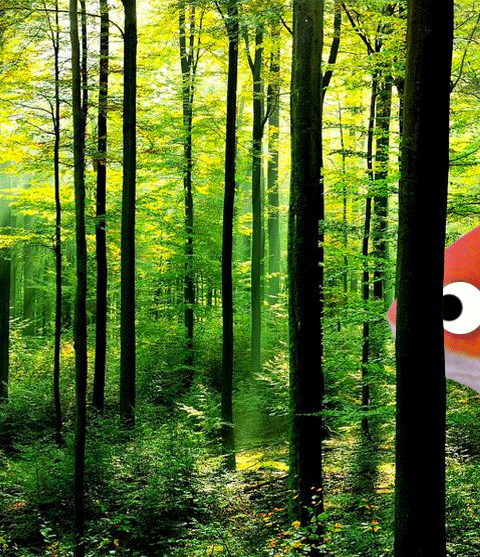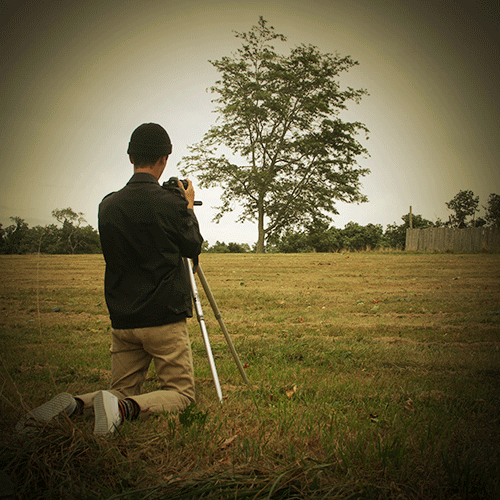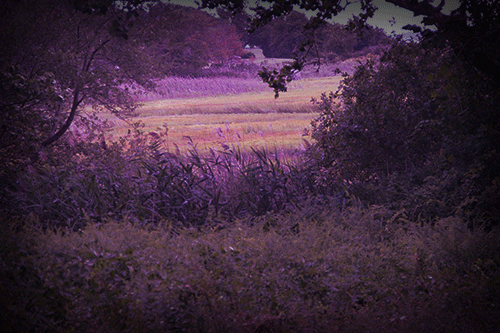
For this exercise we’re going to build a very simple 5-frame GIF animation in Photoshop. This is a bare bones GIF composed of just 2 (or 3) separate layers. An image of forest trees will be our background and animated layer will a goldfish. I tend to ad background layers first and then bring in the animated layers later – but you can build a composition either way.
1, Open Photoshop and create a new file by clicking File/New. When the box opens make the file 480 pixels x 557 pixels x 72 dpi color mode RGB. This is the size I used for the class web page.
2, Add background: Copy and paste a jpeg image from folder, picture file, web etc. Its best if the image exceeds the size of our canvas (480 x 557). Forest example - http://assets.worldwildlife.org/photos/946/images/story_full_width/forests-why-matter_63516847.jpg?1345534028
3, Resize the image using the transform function so a portion of it fills the frame of the Photoshop document by using edit/transform/scale. (Maybe ad a foreground element?)
4, Add the “animated” layer(s) the same way we added the background. Copy and paste a jpeg image into the Photoshop document. Its best if this image isn’t to small relative to the background – when you enlarge g a small image the image quality (resolution) will be affected. Example - http://animalia-life.com/image.php?pic=/data_images/fish/fish8.jpg
5, Clean-up the image. Cut any background away using the Magic wand and Polygonal lasso tool.
6, Rest curser over the layers panel and select large thumbnails (just my preference).
7, Position your foreground layer as if it were the first frame of your animation. (The fish might be positioned entering from the right.)
8, Lets start animating! Open-up the timeline by clicking window/timeline. Be sure “create frame animation” is selected and then click the box. Your first frame of animation should appear.
9, Make 5 frames of animation by clicking the “duplicate selected frame” icon in the menu bar (next to the trash can).
10, In timeline window select the 2nd frame of animation. Go to the layers panel select the fish layer – move the fish to the left a little. Go to frame 3 in the timeline and move the fish a little more – do all 5.
11, Be sure “forever” is selected in the lower right of the timeline and that each frame is set for .01 seconds. Click the play icon and you should see your animation move.
IMPORTANT! To preserve all your layers you must save this as a Photoshop file. To save it as a GIF animation use “save for web” Save it someplace like a folder on your desktop so you can easily retrieve it.
Hint: Don’t be afraid to delete and redo your timeline animation frames! Things can get pretty quirky when you start moving elements around. Just be sure not to delet your photoshop layere. Add more complexity after you get the hang of it!
Adding a little complexity:
1, Save your work then delete all animation frames in the timeline.
2, Duplicate the fish layer. Using the elliptical marquee to replace the fish’s eye with a white circle. Duplicate this new fish layer 3 times, label them A, B and C
3, Select the brush tool – (circular size 27) make the brush color black and ad an eyeball in a different place on each of the new fish layers.
4, Move the fish layer you want to start with (lets say layer A) off to the right of the frame.
5, Make 10 frames of animation by clicking the “duplicate selected frame” icon in the menu bar (next to the trash can).
6, Click each successive frame in the timeline window and move the fish to the right. When the fish is in position for the eye to start to move (lets say 6 frames) go to the layers panel and click off the A layer and click on B layer so the fish’s eye appears to move. Position the B layer fish.
7, Click on the next successive fame in the timeline window (frame 7) and then click off layer B and on layer C so the fish’s eye appears to move again. Position the C layer fish.
8, Click on the next successive frame in the timeline (frame 8) window and select layer A again so the fish’s eyeball is looking straight.
9, Continue to move the fish out of frame.
10, Finally – ad a bit more time to the frames where the fish is looking around so it appears he pauses a bit.
Try out your animation!
Making Animated GIF's


